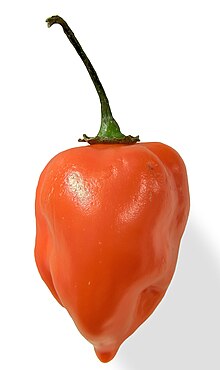Habanero
| Habanero | |
|---|---|
 |
|
| Species | Capsicum chinense |
| Cultivar | 'Habanero' |
| Heat |
|
| Scoville scale | 100,000–350,000 SHU |
The habanero (/ˌhɑːbəˈnɛroʊ/; Spanish pronunciation: [aβaˈneɾo]) is a variety of chili pepper. Unripe habaneros are green, and they color as they mature. Common colors are orange and red, but white, brown, yellow, green, and purple are also seen. Typically, a ripe habanero chili is 2–6 cm (0.8–2.4 in) long. Habanero chilis are very hot, rated 100,000–350,000 on the Scoville scale. The habanero's heat, its flavor, and its floral aroma have made it a popular ingredient in hot sauces and spicy foods.
The name indicates something or someone from La Habana (Havana). In English, it is sometimes spelled and pronounced habañero, the tilde being added as a hyperforeignism patterned after jalapeño.
The habanero chili comes from the Amazon region, from where it was spread, reaching Mexico. A specimen of a domesticated habanero plant, dated at 8,500 years old, was found at an archaeological site in Peru. An intact fruit of a small domesticated habanero, found in pre-ceramic levels in Guitarrero Cave in the Peruvian highlands, was dated to 6500 BC.
The habanero chili was disseminated by the Spanish to other areas of the world, to the point that 18th-century taxonomists mistook China for its place of origin and called it Capsicum chinense ("the Chinese pepper").
Today, the largest producer is Mexico's Yucatan Peninsula. Habaneros are an integral part of Yucatecan food, accompanying most dishes, either in natural form or purée or salsa. Other modern producers include Belize, Panama, Costa Rica, Colombia, Ecuador, and parts of the United States, including Texas, Idaho, and California.
...
Wikipedia
